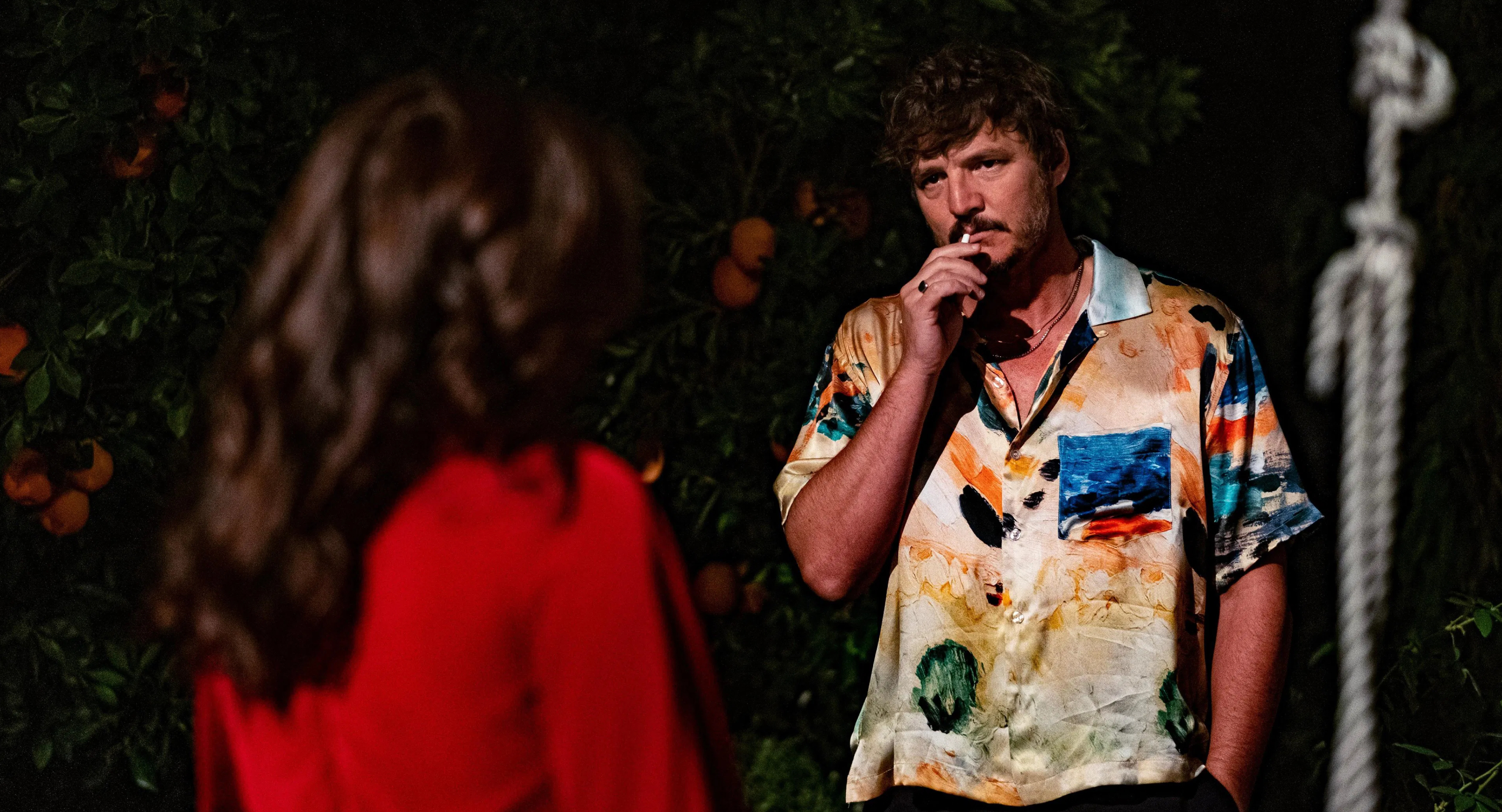The Uninvited – Film Review
Published April 16, 2025

Nadia Conners makes a bold, if uneven, debut with The Uninvited, a comedy-drama that blends social satire with emotional excavation. Known previously for her documentary work, Conners steps into narrative territory with an ensemble cast of seasoned performers, including Elizabeth Reaser, Walton Goggins, Pedro Pascal, Lois Smith, Rufus Sewell, and Eva De Dominici. The result is a claustrophobic yet charged chamber piece that skewers Hollywood ego and the fragile truce of domestic stability — though it sometimes loses its footing in its tonal balancing act.
At the heart of The Uninvited is Rose (Reaser), a once-revered stage actress who has settled into the thankless role of Hollywood wife to Sammy (Goggins), a smug, emotionally evasive agent. Together they host a small party meant to dazzle Gerald (Sewell), Sammy’s most important client — a drug-fueled star with erratic tendencies and a god complex. Into this fragile evening comes Helen (Lois Smith), a disoriented older woman who walks into their mid-century Los Angeles home and calmly insists that she used to live there. The couple’s night of artificial charm quickly spirals into existential chaos.
Conners’ script is tightly constructed, built around awkward silences and escalating discomfort rather than traditional plot twists. She relies on tension, both spoken and unspoken, to drive the evening forward. What begins as a polite effort to escort Helen off the property morphs into something more haunting — a reckoning with memory, identity, and the lies people tell to preserve comfort.
Reaser anchors the film with a beautifully restrained performance. Rose is a woman who’s not quite sure where she’s gone — someone who gave up the part of herself that used to light up stages, now reduced to arranging cheese boards and enduring her husband’s smirking commentary. Conners gives Reaser a lot to work with, especially in the second half of the film when Rose begins to subtly unravel. Her scenes opposite Smith — who imbues Helen with equal parts confusion and eerie certainty — are among the film’s most affecting. The two women seem to be speaking across time, generations apart but somehow connected by a shared sense of displacement.
Walton Goggins, as Sammy, delivers an infuriatingly pitch-perfect performance as the kind of man who believes he’s the smartest person in every room. He weaponizes charm and deflection, keeping the emotional temperature of the evening just below a boil until it inevitably overflows. His interactions with Gerald (Sewell) — who is introduced mid-binge, manic and self-obsessed — showcase the vacuousness of the Hollywood power circle. Sewell leans into the grotesque, playing Gerald as an almost cartoonish exaggeration of industry entitlement. His performance is funny and abrasive, but occasionally veers so far into caricature that it threatens to undermine the more grounded emotional stakes.
Pedro Pascal and Eva De Dominici offer a welcome shift in energy as Lucian and Delia, respectively — actors who orbit the industry’s black hole with varying degrees of awareness. Pascal’s Lucian is surprisingly gentle, a fading star still capable of genuine empathy. A late scene in which he shares a quiet moment with Helen reveals the film’s underlying thesis: in a world obsessed with reinvention, the past doesn’t just vanish. De Dominici plays Delia as a calculated ingénue, too smart for her role but willing to play it anyway — a commentary on how women are still expected to perform submission in Hollywood’s back rooms.
When it comes to its visual style, the film stays mostly confined to the house, but cinematographer Robert Leitzell makes effective use of space and shadows. The warm, well-appointed interiors feel increasingly claustrophobic as the evening unspools. A subtle shift in lighting as night falls mirrors the film’s emotional descent — from glossy perfection into something more raw and vulnerable. The blocking of characters within the space becomes metaphor in itself, with guests gradually pushed toward corners, staircases, and thresholds, their exits blocked not by doors but by what’s left unsaid.
Despite its strengths, the film isn’t without missteps. Conners occasionally overplays the satire, particularly in scenes involving Gerald and Sammy, where the comedy feels more forced than organic. At times, the script stretches its premise too thin, and while the dialogue is often sharp, there are moments that feel overwritten — as if the characters are speaking in metaphors rather than conversation.
Still, as a debut narrative feature, The Uninvited is an impressive effort. It recalls films like Carnage or The Party — one-location dramedies where social etiquette is a mask slowly peeled away. But Conners adds her own flourishes, particularly in how she explores memory and ownership, both literal and emotional. What does it mean to build a life in a place that once belonged to someone else? Who owns a home — the person who holds the deed, or the one who carries its memories?
Lois Smith is the film’s secret weapon. At 94, she brings a quiet, disarming power to Helen, who never raises her voice, never argues — just insists, softly and persistently, that she has a right to be there. There’s no villainy in her presence, only mystery, and Conners smartly never turns her into a plot device. She is not a ghost, but she haunts the home all the same.
The Uninvited ends not with resolution but with a kind of acceptance — that the lives we curate are fragile things, easily disrupted by memory, by strangers, by truths too long ignored. It’s a film that asks questions more than it answers them, and while its balance of comedy and drama doesn’t always land, it offers plenty to chew on for viewers willing to sit with the discomfort. It’s not flawless, but it’s rich with intent and anchored by strong performances. Nadia Conners shows promise as a filmmaker with something to say — and just enough bite to make it land.
